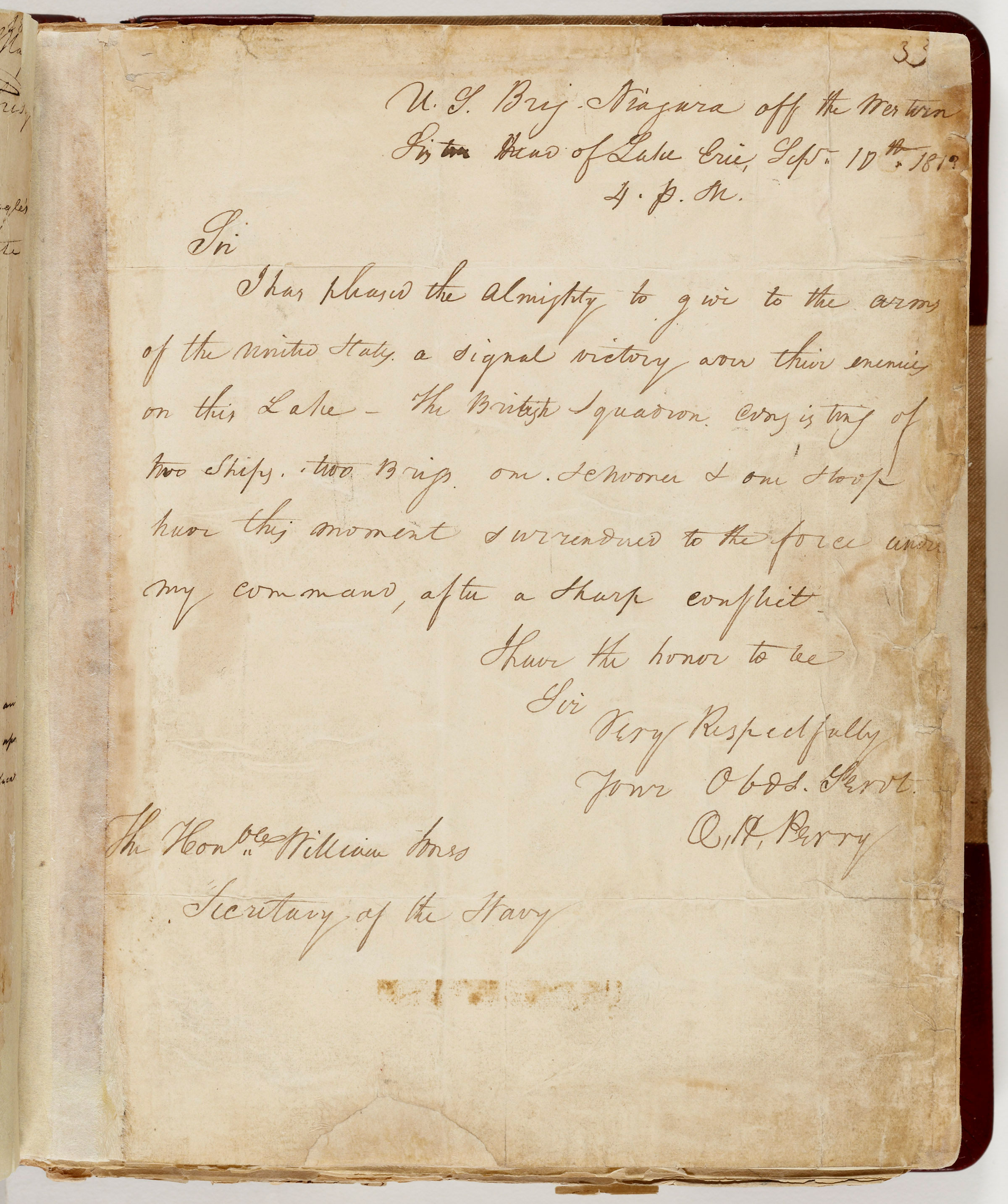
National Archives Presents Special Document Displays in September
Press Release · Wednesday, September 11, 2013
More Information
Washington, DC…The National Archives commemorates two historic anniversaries with special document displays in September. The first display commemorates the 200th anniversary of the surrender of the British on Lake Erie, and the second display marks the 180th anniversary of the Siamese-American Treaty of Amity and Commerce, the first treaty ever signed between the United States and an Asian nation.
The displays are free and open to the public in the East Rotunda Gallery of the National Archives Building in Washington, DC, which is located on the National Mall on Constitution Avenue between 7th and 9th Streets, NW.
Commodore Oliver Perry's Report on surrender of the British on Lake Erie
Now through September 19, 2013
In commemoration of the 200th anniversary of the Battle of Lake Erie in the War of 1812, the National Archives displays the original letter from Commodore Oliver Perry to the Secretary of the Navy describing the surrender of the British on Lake Erie.
Early in the War of 1812, the Americans lost control of Detroit and Lake Erie to the British and their Native American allies. The U.S. Navy sent 28-year-old Oliver Hazard Perry to Lake Erie to build a squadron and retake that important waterway.
With a crew Perry described as "a motley set, blacks, soldiers and boys," the Americans met Britain's powerful Royal Navy on Lake Erie. A flag flew above Perry's ship, the Lawrence, emblazoned with the words "Don't Give Up the Ship." This battle cry was the dying command, in an earlier battle, of Perry's friend Capt. James Lawrence (for whom the ship was named).
In the middle of the battle, Perry abandoned the Lawrence because it had become disabled and two-thirds of its crew perished. Refusing to surrender, Perry was rowed to the Niagara and then commanded his squadron to an unprecedented victory on September 10, 1813. This letter from Perry to Secretary of the Navy William Jones declares the battle
"a signal victory." In a war marked by early failures, this victory secured Ohio and the territories of Michigan and Indiana. It also provided a needed boost in national morale and marked a rare surrender of a complete Royal Navy squadron.
Siamese-American Treaty of Amity and Commerce
September 20 through October 6, 2013
The start of official diplomacy between the United States of America and the Kingdom of Siam (now Thailand) was marked by the signing of the Treaty of Amity and Commerce in 1833 -- the first treaty between the United States and an Asian nation.
In February 1832, President Andrew Jackson sent Edmund Roberts as his emissary to Southeast Asia to negotiate treaties of friendship and commerce with nations in the region, including Thailand—then referred to as Siam. Leaving Boston in March, 1832, aboard the U.S.S. Peacock, Roberts stopped in the Philippines, Macao, Vietnam, and Thailand.
Nearly a year later, Roberts was presented to the King of Thailand. On March 20, 1833, the two sides agreed to a Treaty of Amity and Commerce. Key sections of the agreement stipulated that "There shall be a perpetual Peace between the Magnificent King of Siam and the United States of America." Further, American trading vessels would be free to enter Thai ports "with their cargoes … and they shall have liberty to sell the same to any of the subjects of the King."
The National Archives is fully accessible, and Assisted Listening Devices are available in the McGowan Theater upon request. To request a sign language interpreter for a public program, please send an email to public.program@nara.gov or call 202-357-5000 at least two weeks prior to the event. To verify dates and times of the programs, call 202-357-5000 or view the Calendar of Events online. To contact the National Archives, please call 1-866-272-6272 or 1-86-NARA-NARA (TDD 301-837-0482).
# # #
For press information, contact the National Archives Public Affairs Staff at 202-357-5300.
Connect with Us on:
Twitter: http://www.twitter.com/@USNatArchives
Facebook: USNationalArchives
Tumblr: http://usnatarchives.tumblr.com
13-135
This page was last reviewed on February 8, 2019.
Contact us with questions or comments.

